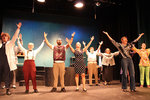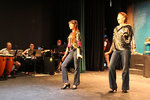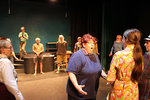


On a recent night at the Roxy Theatre in Morton, rehearsal for “Little Shop of Horrors” started with yoga.
With her cast standing in a circle, Director Sarah Hartman led them in some warm-up exercises. She then gave them a short pep talk about daring greatly and failing greatly. Then, there was a lesson in emoting while singing.
That’s because while being a professional musical production, “Little Shop of Horrors” is also a learning experience. Opening Aug. 3 at the Roxy Theatre in Morton, the show is a collaboration between the Fire Mountain Arts Council of Morton and Centralia College East. The play was offered as a course at Centralia College East, where students could experience the process of putting together a musical from the first read-through to costuming and then performing their piece for the public.
“It’s a huge learning process,” explained Hartman, who is serving as an adjunct faculty member for Centralia College East for the show. “It challenges people greatly. They learn music. They learn acting. They learn dance. They learn. They learn team building. They learn public speaking. I think most importantly there’s this breaking point where you realize ‘I have to do all of these things in front of people and we’re doing it in 10 days.’”
The musical is the classic Howard Ashman and Alan Menken sci-fi story, probably best known for its 1986 movie version starring Rick Moranis.
In this version, down and out Seymour Krelborn (portrayed by Arian Mohajer) finds a strange plant during a solar eclipse and brings it back to Mr. Mushnik (portrayed by Vann Cantin), the owner of a failing flower shop on the bad side of town. He names the plant Audrey II for his co-worker and love interest Audrey (portrayed by Amy Ballard). Soon, Audrey II has brought the little flower shop some big fame but at a price.
“The music is wonderful. It’s a classic doo wop feel to it and its songs the musicians really love playing,” Hartman said. “Plus, it’s a very recognizable title. We hope it pulls in audience members.”
Four different sized Audrey II puppets, one of which is big enough to swallow a person, will be voiced by Troy Reich, who also portrays the sadistic dentist, Orin. Bruce Roberts serves as puppeteer for the creations being crafted by Hartman herself.
“Little Shop of Horrors” is a comedy but it contains some dark elements. And the musical version that will be presented at the Roxy is similar to the movie except for the ending. Hartman said the original ending did not test well with audiences for the 1986 movie, so a different, happier ending was added. But this version has its own charm, explained Daniel Hankins, who portrays Patrick Martin and is part of the ensemble.
“I like the songs and I like the comedy in it,” he said. “I do enjoy the dark humor.”
About 30 cast and crew are part of the Roxy’s summer production. They range from veterans of the stage to people who joined the class for their first experience on the stage. In her second year, Debra Kerr, portraying Mrs. Luce and a botanist, said she came back because she enjoyed the learning environment and being able to grow as an actress.
“It’s a fun,” Kerr said of the show. “Everyone’s working really hard and it’s going to be a great show.”
The production also includes a live, six-piece live band: Jessica Scogin, lead; Brad Nelson, saxophone; Martha Sturgeon, piano; Tiffany Williams, bass; Steve Pedicone, guitar; and Dan Wright, drums. Hartman said it was important for her to have live musicians, first because Lewis County boasts so many talented musicians, but also because there is a collaborative feeling from live music that lends to the integrity of a piece, she said.
“It’s happening right here, right now there’s sometimes errors because we’re all human and I think it’s beautiful that way,” Hartman said.
For drummer Wright, Morton, being part of a live band for a musical is a way for him to continue to have music in his life as has been the case for the last 50 years. It is also, he said, a chance to be a part of something bigger than himself.
“To be able to get to do something that’s part of my community is to me the height of achievement,” Wright said. “It isn’t pay. It isn’t accolades. It’s making the community better.”